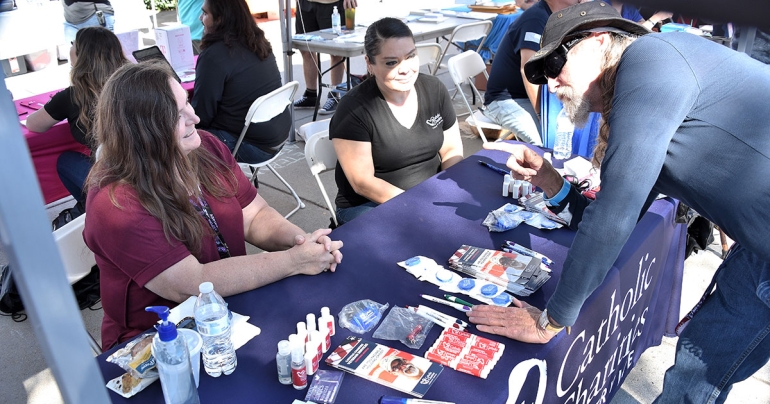For veterans experiencing homelessness, it can be difficult or nearly impossible to track down and navigate all the resources needed to get back on their feet. While individual circumstances vary from one person to the next, access to help is a universal barrier that most unsheltered people face.
Stand Downs Serve as a One-Stop Shop
- What is a Stand Down?
A Stand Down is an event focused on connecting veterans to needed resources. The first Stand Down took place in 1988 as a response to the crisis of veterans experiencing homelessness. Most are one- or two-day events. - Who can attend?
Stand Downs are open to anyone, not just veterans. Community members and families of veterans are encouraged to help connect those in need to services. - What kinds of services are provided?
Two-day events typically provide some form of overnight housing for veterans that includes access to showers and a hot meal. This may be the first hot meal a veteran has had in days or weeks. Often, attendees are also given a backpack of food that doesn’t require cooking. Other services may include haircuts and free medical care such as HIV and TB testing, vaccinations and wellness checks. Some Stand Downs also provide dental care and cleanings. - Who organizes Stand Downs?
Usually, Stand Downs are organized by local Veterans’ organizations partnering with other social service agencies in the community. Sometimes Stand Downs are organized by local Veterans’ Courts. The goal of Veterans’ Courts is to help veterans become active members of their communities. They bring together legal counsel, court staff, the VA and other support organizations to help veterans facing a criminal legal issue. - Why would a veteran need legal support?
For most veterans, the reason they’re involved in the legal system is tied directly to the issue of homelessness. It’s important to realize that many veterans face legal issues because of their situation, not because they’ve committed serious crimes. Veterans experiencing homelessness often have no choice but to find shelter in public places like parks, where staying overnight is considered trespassing. Those who do stay overnight can be issued a ticket or arrested. Tickets and arrests usually come with fines, which veterans experiencing homelessness are often unable to pay, and a veteran who can’t pay the fine risks getting a warrant for failing to appear in court. - How do Stand Downs assist veterans with legal issues?
The service of lifting warrants is a vital part of Stand Downs. This allows veterans to improve their situations, rather than risking the accumulation of more fines. - What other types of resources are available?
At Stand Downs, community partners set up tables for veterans to visit and connect to resources. They help attendees with gaining employment, educational resources and finding housing. Basic needs items are also provided like clothing, sleeping bags, tents, hygiene kits and more.
Help Veterans Experiencing Homelessness
Catholic Charities Veterans Services is one of the many community partners that participates in Stand Downs. Veterans Services helps veterans and their families who are experiencing homelessness or at risk of homelessness find stable housing and provides ongoing case management that includes financial planning, assistance applying for VA benefits, emergency assistance and more.
If you’re interested in supporting the Veterans Services program and its work with Stand Downs, showing your support is easy! You can donate online, provide needed items to veterans with our Amazon Charity List, or contact your nearest Catholic Charities location about the next Stand Down in your area.

